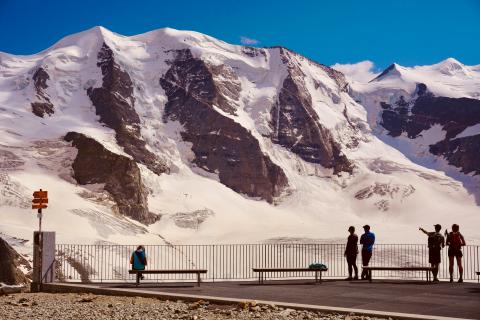Cultural eco-studies for more just relationships between humans and the environment
We might think we're objectively observing nature, its aesthetics, and management, but we may not be aware of the biases in terms of power, gender, culture, and colonial relationships, for example. Kate Huber specializes in multimedia cultural analysis, postcolonial studies, and transnational environmental justice. She researches how various media, such as literature, film, photography, and radio, shape our understanding of the world.
'That perspective is influenced by ideas about gender, color, and colonial relationships. Historians, such as Carolyn Merchant, have shown how Enlightenment thinkers like philosopher Francis Bacon and physicist Isaac Newton divided nature into a civilized, male part and a wild and attractive female part. The man is the subject who looks at the female nature object, which must sustain him. Thus, political and economic powers justified how they subjugated and colonized nature during the colonial period. Due to such thought patterns, Western powers moved natural resources to their own countries. Ethnicities and indigenous people not claimed by the West remain in a submissive position in these colonial gender hierarchies, often in poverty. And precisely because humans and nature are interconnected, you see the migration towards the wealth amassed by the West.'

I learned to love complex ecosystems of which people are a part and upon which they depend
Career inspiration
'I've always been connected to nature. I grew up in Olympia, Washington, a volcanically active area. When I was eighteen, I experienced an earthquake. Authorities always advised us to stand under a doorframe, and when I stood there, I not only felt the earth's movement but also saw the waves in the ground, as if it were water. Volcanic eruptions were also part of life; nature was always present. I learned to love complex ecosystems of which people are a part and upon which they depend.
I didn't want to study; I hated school and signed up for a sailing ship, becoming a deckhand in the Caribbean. On one of the islands, inhabited by only 300 people, I saw a wealthy man putting a fence over half of the land. He was going to rent that part to cruise ships. Many of those relatively wealthy white people from the cruise ship wanted to sunbathe on the white beach, while mostly black women behind the fence sold them things like T-shirts. These women weren't even allowed on the beach. I saw how everything came together on that island: color, ethnicity, class, gender, and the environment. That's when I decided to go to university, to understand such situations, to see if we can do something about inequality.'
Huber heard about environmental studies and postcolonial ecocriticism and came to study in the Netherlands. She also worked in journalism and at corporate communication departments 'pushing the world in a direction I didn't want to go. I had many friends from Ireland, which also suffered from colonial and postcolonial developments. Because of that, I asked more questions, and eventually, I returned to the U.S. to pursue a PhD at the University of Oregon, known for its environmental research. Nature, colonialism, gender, and ethnicity also converge in Ireland, and that's the focus of my first book project.'
I also want to discover how media, art, and environmental movements can portray and create more just relationships
Interdisciplinary theories and disciplines
'My work is interdisciplinary. I essentially examine how colonial relationships with the environment reoccur in modernity by reproducing thought patterns to which people have become accustomed. This involves ideologies and neocolonial economic structures that determine parts of the world are natural, while another part is allowed to be ugly or uninhabitable, where the rich don't live. I also want to discover how media, art, and environmental movements can portray and create more just relationships.
While I use eco-feminist theories, I also use, for example, eco-media theory, which considers the materiality of media. Currently, I'm working on an article about an Irish hip-hop artist who manipulates iconic landscapes over Ireland by connecting them to mining, thus bringing about digitalization. This leads to the topic of environmental justice. All these movements can't be seen separately. Ecocriticism deals with that, and it's one of the fastest-growing disciplines in the humanities. Therefore, I want to share these interdisciplinary theories and disciplines with students.'
She received a TSHD Seed Grant for her research, collaborating with the law faculty on environmental justice and migration. The project is called 'Decolonizing Globalization: Reading Migration through an Environmental Justice Lens.' With the grant, Huber organized two guest lectures on art, activism, and environmental justice alongside a research colloquium for teachers and five workshops for students on climate justice and migration. Students who participated in the workshops created a video about it.
Like our life with nature, research is a relationship, and it's never finished
Justified relationships between humans and the environment
'Earlier in my life, of course, I wanted to solve all the inequalities stemming from colonial relationships with the earth, relationships that have been ongoing for hundreds of years and that we still deal with. I still want that, but I now realize that the past always stays with us. We must bear witness to histories and experiences that shape relationships between people, animals, and environments. I see my work more as a dialectic or dialogue with the cultural and material environments I study. Like our life with nature, research is a relationship, and it's never finished.
I am satisfied when my work prompts people to keep asking questions and try to steer policies in the right direction. I hope my work gives readers the tools to critically study and draw conclusions with courage because some issues remain very challenging. For example, the mining for the transition to green energy still relies on neocolonial extraction that exacerbates inequalities. I want my work to illuminate that complexity so that we can continually work towards more justified relationships between humans and the environment.’
